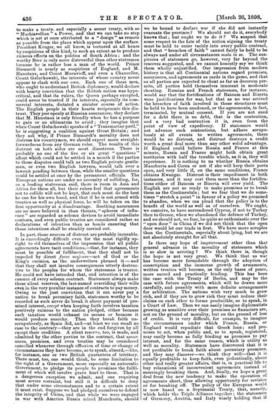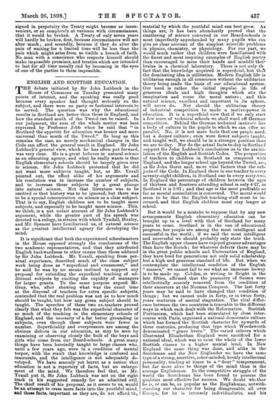THE MORALITY OF STATESMEN.
NOTHING threatens the peace of the world so directly as the difficulty which statesmen in the different countries feel in trusting one another. They are pro- foundly sceptical as to each other's morality. They do not believe each other's assurances as to facts, they expect evasion of each other's promises, they never rely in diffi- cult circumstances upon a continuity of fidelity even among the successive rulers of a single generation. So intense is this feeling in regard to England, that it is declared all over the Continent to be next to impossible to make a treaty, and especially a secret treaty, with so "Machiavellian " a Power, and that we can take no step which is not at once attributed to a "design" as remote as possible from the plans which appear upon the surface. President Kruger, we all know, is tortured at all hours by suspicions of this kind, to such an extent as to produce ruinous effects on the politics of South Africa ; and the worthy Boer is only more distrustful than other statesmen because he is rather less a man of the world. Prince Bismarck is nearly as suspicious of England, and M. Hanotaux, and Count Muravieff, and even a Chancellor, Count Goluchowski, the interests of whose country never appear to clash with our own. Each one of these men, who ought to understand British diplomacy, would declare with hearty conviction that the British nation was hypo- critical, and that its rulers, the Queen perhaps excepted, could never be trusted if its interests, especially its com- mercial interests, dictated a sinister course of action. The English people in their hearts reciprocate this dis- trust. They jeer openly at Russian assurances; they declare that M. Hanotaux is only friendly when he has a purpose to gain or an ultimatum to avoid ; they imagine that when Count Goluchowski speaks of a" Transmarine peril," he is suggesting a coalition against Great Britain ; and they ask why, if Prince Bismarck's morality does not distress his countrymen, we should expect more straight- forwardness from any German ruler. The results of this distrust on both sides are most disastrous. There is probably no one of the five or six great "questions" afloat which could not be settled in a month if the parties to those disputes could talk as two English private gentle- men, or even two English lawyers, would talk over a lawsuit pending between them, while the smaller questions could be settled at once by the permanent officials. The European nations are under no necessity of colliding, for, as a leading statesman said, there is room in Asia and Africa for them all, but their rulers feel that agreements not to collide will not be kept, that each must do the best he can for his own hand, and that if he is not armed with treaties as well as physical force, he will be taken on the first opportunity at a disadvantage. Soothing assurances are no more believed in than threats, "spheres of influ- ence" are regarded as solemn devices to avoid immediate contests, and even public treaties are considered rather as declarations of intention than as bonds ensuring that those intentions shall be steadily carried out.
In part, these sources of distrust are probably incurable. It is exceedingly difficult even for the most rigidly up- right to rid themselves of the impression that all public agreements have tacit conditions,—that, for instance, they must be possible of fulfilment, that they shall not be impeded by direct force majeure—act of God or the King's enemies, as the underwriters phrased it— and that they shall not involve consequences utterly destruc- tive to the peoples for whom the statesman is trustee. He could not have intended that, and intention is of the essence of every solemn contract. Statesmen always make these silent reserves, the last-named overriding their wills even in the very peculiar instance of contracts to pay money. Owing to the just conviction that it can never pay a nation to break pecuniary faith, statesmen worthy to be recorded as such never do break it about payment of pro- mised interest, except when keeping faith involves taxation positively ruinous to the nation pledged, either because such taxation would exhaust its means or because it would produce anarchy. Then they break faith un- scrupulously, as Spain did, and—at least we can recall no case to the contrary—they are in the end forgiven by all except their creditors. A silent reserve, too, is made, and admitted by the other parties to the contract, that assur- ances, promises, and even treaties may be considered cancelled whenever through effiuxion of time or change of circumstances they have become, so to speak, absurd,—like, for instance, one or two British guarantees of territory. There must, too, one would think, be some limitation to the right of a Government, more especially an autocratic Government, to pledge its people to promises the fulfil- ment or which will involve grave hurt to them. That is a dangerous exception we admit, and one requiring most severe restraint, but still it is difficult to deny that under some circumstances and to a certain extent it must exist. Suppose we had pledged ourselves to defend the integrity of China, and that while we were engaged in war with America Russia seized Manchuria, should we be bound to declare war if she did not instantly evacuate the province ? We should not do it, everybody knows that ; but ought we to do it ? We suspect that some respect to the fate of the nation signing the treaty must be held to enter tacitly into every public contract, and that "breaches of faith" cannot fairly be held to be always and under all circumstances mala in se. The sus- picions of statesmen go, however' very far beyond the reserves suggested, and we cannot honestly say we think them wholly unjustified. Our impression from modern history is that all Continental nations regard promises, assurances, and agreements as cards in the game, and that as all parties are expected to cheat as far as decorum per- mits, all parties hold themselves innocent in moderate cheating. Russian and French statesmen, for instance, would say that the fortifications of Batoum and Biserta were justifications for war, but that as no war arrived the breaches of faith involved in those structures must be held to have been condoned, or the agreements, in fact, terminated, by mutual consent. If you are not sued for a debt there is no debt, that is the contention, and a very bad contention it is, even from the point of view of expediency. If statesmen would not advance such contentions, but adhere scrupu- lously at all events to written agreements, there would be no distrust, and distrust destroys a credit worth a great deal more than any other solid advantage. If England could believe Russia and France at this minute, Russia and France might both obtain great territories with half the trouble which, as it is, they will experience. It is nothing to us whether Russia obtains Manchuria and Corea or not if she will keep their ports open, and very little if, on the same conditions, France obtains Kwangse. Distrust is their impediment in both instances, and it may cost them more than the fortifica- tions either of Batoum or Biserta will ever yield. The English are not so ready to make promises or to break them as the Continentals ; but we fear that we do some- times "stretch a point" in favour of a policy we promised to abandon, when we can plead that the policy is to the benefit of the world as well as of ourselves. We ought, we conceive, to have surrendered Cyprus if not to Turkey then to Greece, when we abandoned the defence of Turkey, and we should not, we fear, be quite so enthusiastic over the " open door" in China if we did not think that the open door would let our trade in first. We have more scruples than the Continentals, especially about lying, but we are not absolutely straight for all that.
Is there any hope of improvement other than that general advance in the morality of statesmen which is so slow in arriving ? We think there is, though the hope is not very great. We think that as war has become more formidable through the adoption of conscription and the immense growth of armaments, written treaties will become, as the only bases of peace, more sacred and practically binding. This has been the case with the Treaty of Berlin, and may be the case with future agreements, which will be drawn more carefully, and possibly with more definite arrangements for arbitration. The nations wish very much to grow rich, and if they are to grow rich they must reduce their claims on each other to forms producible, so to speak, in a Court of Law. Then we can easily imagine diplomatists growing as sensitive over their promises as financiers are, not on the ground of morality, but on the ground of loss of credit. It is very difficult, for example, to imagine the circumstances under which France, Russia, or England would repudiate that Greek loan; and pro- mises to act, when public and, so to , speak, registered, may easily become as fully binding as promises to pay interest, and for the same reason, which is utility as well as morality. Statesmen have discovered that it is not profitable to break faith about pecuniary promises, and they may discover—we think they will—that it is equally profitable to keep faith, even pedantically, about other and really greater affairs, that is, in practical life to buy relaxations of inconvenient agreements instead of sneeringly breaking them. And, finally, we hope a great deal from the new tendency to make the operation of agreements short, thus allowing opportunity for revision or for breaking off. The policy of the European world is now based on a Septennial Treaty, that, namely, which holds the Triple Alliance together ; the statesmen of Germany, Austria, and Italy wisely holding that if signed in perpetuity the Treaty might become so incon- venient, or so completely at variance with circumstances, that it would be broken. A Treaty of only seven years will hardly be broken, first, because circumstances will not alter much ; and secondly, because if they do alter the pain of waiting for a limited time will be less than the pain which might arise from so visible a breach of faith. No man with a conscience who respects himself should make impossible promises, and treaties which are intended to last for all time usually end by becoming in the eyes of one of the parties to them impossible.








































 Previous page
Previous page